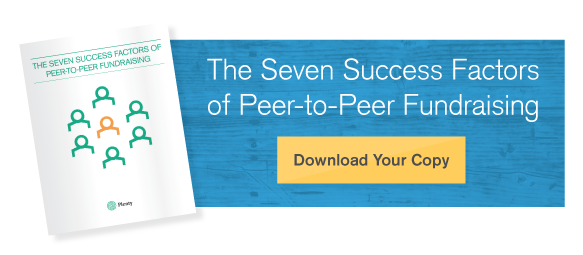From Defending Corporations to Supporting Causes
[Editor's Note: Here at Plenty we are constantly meeting and partnering with organizations and companies in the nonprofit space that are impacting the sector in big ways. We are excited to bring this community of leaders, thinkers, and motivators together on our blog, and share their innovative and aspirational ideas. Below is a guest post from one of these inspiring companies forging the path of change. Enjoy, and happy reading!]
After three years of law school, three months of bar study, and four months of awaiting bar results, I was eager to start practicing. I took what I perceived to be the best opportunity presented to me and hit the ground running. As many first year associates do, I quickly discovered that corporate defense and collection litigation was not for me and was significantly affecting my happiness outside of the office. After one year it was back to the drawing board. I was scared, unsure, confused, stressed, worried, and regretting my choice to attend law school. This all changed when I volunteered for the San Diego based nonprofit, Invisible Children, and my worldview shifted. Dramatically.
Suddenly I was filled with inspiration, drive, motivation, ambition, and a desire to help people in any way I could. My law license was no longer a sword to attack small businesses or unprepared individuals. No, my law license became a shield that could help protect an entire organization built upon bettering the lives of others. I even found that the terrible experience I endured the previous year afforded me volumes of litigation and business acumen that is tremendously helpful for nonprofits and small businesses alike.
Not only did this paradigm shift shake things up for my practice of law, but it brought me back to what drove me before the cynicism of adulthood and law school set in. I once again cared about things; things like investing in community, the arts, honest conversation, affecting change, and simply trying to do good for others. Those things mattered again and my appreciation for my life returned.
Fast forward roughly a year to when I became part of the Invisible Children legal team, working on international contracts, media licenses, human resources, dispute resolution, and overall legal guidance for an exceptionally diverse organization. While doing so, I picked up pro bono clients, helping them with forming businesses, drafting their agreements, and protecting their intellectual property. It was such a gratifying turn of events for me, and an incredible opportunity to gain a very unique In-House Counsel perspective. Invisible Children also served as a gateway to meeting other inspiring professionals who are working to change our world. One of those people ended up being the General Counsel of Invisible Children, Emily Wilkinson, who guided me and empowered me to become the confident attorney I am today. Emily built the legal department from scratch and served as Corporate Secretary for Invisible Children, both of which were difficult gigs.
Now fast forward a few more months to the present where I, among others, were recently impacted by changes Invisible Children is making to significantly reduce its US workforce to become more nimble at a time when it is closer than ever to seeing an end to the LRA conflict in Africa. The first year associate me would have been devastated and unsure what to do next when I was let go. However, with a newfound purpose and meaningful connections, Emily Wilkinson and I teamed up to create Wilkinson Mazzeo – a law practice dedicated to helping creative and cause-based communities.
Founded on our love for community, art, helping others, and an overall love of people, we hope to provide the support that nonprofits and creative businesses need. And by utilizing modern developments like shared workspace, cloud storage, and of course our smartphones, we offer our services at an affordable rate. In other words, Wilkinson Mazzeo seeks to become the one-stop-shop for incorporating a business, building a dream board of directors, managing risk, protecting intellectual property such as trademarks and copyrights, and everything in between, all while guiding the organization in its efforts to stay in compliance with state regulations and statutes, naturally.
On that note, we want to get the ball rolling on helping cause driven individuals and organizations like you. So, here are the five legal tips we think every nonprofit should know:
-
Protect your brand. You might be surprised to find that you already have “common law” rights to your copyright(s) and trademark(s), but in order to fully protect your brand you should register them with the US copyright and trademark offices. Remember to ask permission and enter into licensing agreements when you use the intellectual property (like copyrights and trademarks) of other organizations and individuals. This is important, not only legally, but also to protect the integrity of your brand.
-
Avoid entering into employment contracts. As a general rule of thumb, avoid entering into contracts with your employees. Instead, issue a non-binding offer letter with an attached job description. This puts the employee in the “at-will” category, which allows you or the employee to part ways at any time without legal repercussions.
-
Don’t forget your state and federal requirements. Nonprofit corporations are required to abide by the laws of the state in which they are incorporated. In California, this means having an active board of directors, maintaining meeting minutes, adopting certain policies, and keeping up with state filings. Additionally, to maintain your nonprofit’s 501(c)(3) (tax-exempt) status with the federal government, it must be operated exclusively for tax-exempt purposes and none of its earnings should benefit a private individual. Also, your 501(c)(3) nonprofit should keep political lobbying activities to a minimum and should avoid participating in political campaigns altogether. Other 501(c) structures are better for political activity.
-
Create an advisory council as a stepping-stone to your dream board. The task of building a board of directors can seem overwhelming. At Invisible Children, when we set out to double the size of IC’s Board, we created an advisory council first. It was a no-brainer for IC’s most influential supporters to join the advisory council because it was ambassadorial in nature, a great networking opportunity, and less of a commitment. It enabled our top supporters to get to know the organization. As a result, joining the board became a no-brainer for our top board member prospects.
- Take calculated risks. Worrying about the risks associated with running an innovative nonprofit can be distracting from the mission. Obtain help from attorneys who can advocate on your behalf, shield you from a lot of headaches, and save you money in the long run.
We hope that the tips above prove to be helpful to you and your organization, and that by reading this it plants even the smallest seed of inspiration. Whether that be inspiration to start a project you’ve wanted to begin or inspiration to make a career change, I implore you to do it. Taking my first year associate position didn’t feel the least bit risky and neither does staying at a job you hate. It’s easy. But I can attest firsthand to taking risks that you know in your bones you should take and how that decision, however terrifying it may be, can reroute your life for the better.
Disclaimer: The information in this article is presented for informational purposes only, and should not be taken as legal advice. Before acting on any information presented in this article, you should consult an attorney regarding the facts of your specific situation. We would love to hear from you, so please feel free to contact Wilkinson Mazzeo for a consultation.
Author: Sam Mazzeo, Partner, Wilkinson Mazzeo
Curious about what else your nonprofit needs to know in order to succeed? Download our free e-book "The Seven Success Factors"!
Share this
You May Also Like
These Related Stories
Let’s Do It Together
Get Your Nonprofit Board "On Board" With Your P2P Development




No Comments Yet
Let us know what you think